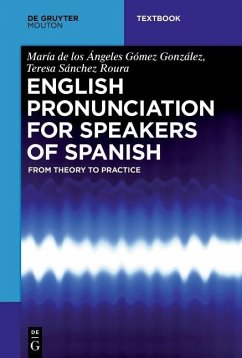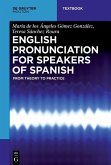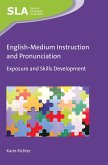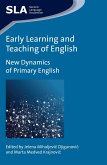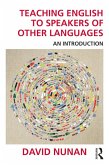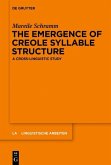The book covers the key concepts of English phonetics and phonology in seven chapters written in an accessible and engaging style:
1. Phonetics and Phonology
2. The Production and Classification of Speech Sounds
3. Vowels and Glides
4. Consonants
5. Segment Dynamics: Aspects of Connected Speech
6. Beyond the Segment: Stress and Intonation
7. Predicting Pronunciation from Spelling (and vice versa)
Features:
- in-text audio illustrations, as well as over a hundred written and audio exercises with corresponding keys and different kinds of artwork (Tables, Figures, illustrations, spectrograms, etc.)
- classic readings in the discipline in the Further Reading section of each chapter
- highlights the phonetic contrasts and specific cues that are more important to aid comprehension in English and offers guidelines on "correct" pronunciation habits to help SSLE sound as close as possible to native English
The book's companion website, EPSS Multimedia Lab, can be used on computers, smartphones and tablets, and is useful for the self-taught student and the busy lecturer alike.
Features of the website:
- a complete sound bank defining and illustrating the sounds of English RP as compared with those of Peninsular Spanish
- written definitions and animated diagrams, videos and original recordings (by native speakers of English and Spanish) showing the articulation of each sound, alongside its most common spellings, as well as pronunciation practice for individual words and whole sentences
- a comprehensive selection of over a hundred written and audio exercises (with their keys) for practice both at home or in the language lab
- audio files corresponding to the audio illustrations given in the written book
- a repository of useful resources by topics and a list of online glossaries and pronunciation dictionaries
Dieser Download kann aus rechtlichen Gründen nur mit Rechnungsadresse in A, B, BG, CY, CZ, D, DK, EW, E, FIN, F, GR, HR, H, IRL, I, LT, L, LR, M, NL, PL, P, R, S, SLO, SK ausgeliefert werden.
Laura Rupp, VU University Amsterdam
The breadth of coverage is truly impressive, ranging from basic aspects of phonology and phonetics to more pervasive and indeed complex aspects pertaining to spelling and intonation. These aspects have been either underrepresented or systematically left out in most phonology/phonetics textbooks targeted towards a similar readership.
Francisco Gonzálvez García, University of Almería
The originality of this book lies above all in its contribution to the solution of practical problems. It is strongly contrastive, detailing where English differs from Spanish and enabling learners to perfect their attempts to imitate the Received Pronunciation of English. It also contains a wealth of relevant (and often challenging) exercises, all supplied with keys. The companion website makes the text come truly alive with audio recordings and innovative videos, in addition to other resources.
J. Lachlan Mackenzie, CELGA-ILTEC, Coimbra

